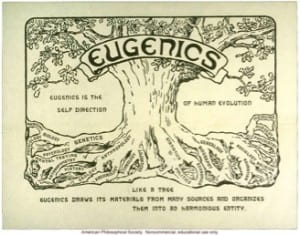Eugenics. What does the word mean? What is its genesis? And more importantly, what is its legacy?
By ucyow3c, on 7 November 2014
![]() Written by Natalie Clue, Human Genetics BSc
Written by Natalie Clue, Human Genetics BSc

Eugenics tree, 1921. Credit: American Philosophical Society.
I write this post after a whirlwind introduction to the discipline of eugenics and its inextricable connection to our university, upon reading an article written by Dr Nathaniel Adam Tobias Coleman, recently published in Times Higher Education. In a matter of weeks, I came to learn much more about the dark legacy of the celebrated figurehead in which our university takes immense pride: Francis Galton.
He is lauded as a polymath and eminent scientist who worked on biostatistics and human genetics, as well as a traveller and inventor of scientific instruments and a contributor to the subjects of meteorology and criminology. He was also the founding father of eugenics.
I learnt that the word eugenics is derived from the Greek word eu (‘good’ or ‘well’) and the suffix –genēs (‘born’), and that it was coined by Galton in 1883. I learnt that his definition of eugenics was “the study of the agencies under social control that may improve or impair the racial qualities of future generations“.
I also came to discover that a prime motivation for the research which led to many of the ‘achievements’ noted above was the motivation to determine what constituted ‘desirable’ and ‘undesirable’ traits among the peoples of the world, to legitimise the theory of racial supremacy – with the ‘Aryan’ race being the ‘master’ of all and the ‘Negro’ being the least of the ‘lesser’ – and to classify these ‘lesser’ races as non-occidental or ‘other’.
 Close
Close

